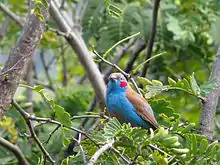Uraeginthus
Uraeginthus is a genus of birds in the family Estrildidae.
| Uraeginthus | |
|---|---|
 | |
| Red-cheeked cordon-bleu (Uraeginthus bengalus) | |
| Scientific classification | |
| Kingdom: | Animalia |
| Phylum: | Chordata |
| Class: | Aves |
| Order: | Passeriformes |
| Family: | Estrildidae |
| Genus: | Uraeginthus Cabanis, 1851 |
The genus was introduced by the German ornithologist Jean Cabanis in 1851.[1] The type species was subsequently designated as the red-cheeked cordon-bleu.[2] The name Uraeginthus combines the Ancient Greek words oura "tail" and aiginthos for an unknown bird, perhaps a finch.[3]
It contains the following five species:[4]
| Image | Scientific name | Common Name | Distribution |
|---|---|---|---|
.jpg.webp) | Uraeginthus angolensis | Blue waxbill | from Cabinda and the Congo to Kenya and Tanzania in the east south to northern South Africa. |
_male.jpg.webp) | Uraeginthus bengalus | Red-cheeked cordon-bleu | Ethiopia, Uganda, Kenya, Tanzania , Angola, south Democratic Republic of the Congo and north Zambia |
_2_(44771771850).jpg.webp) | Uraeginthus cyanocephalus | Blue-capped cordon-bleu | Ethiopia, Kenya, Somalia, South Sudan, and Tanzania in East Africa. |
.jpg.webp) | Uraeginthus granatinus | Violet-eared waxbill | Southern Africa. |
 | Uraeginthus ianthinogaster | Purple grenadier | Ethiopia, Kenya, Somalia, South Sudan, Tanzania and Uganda |
References
- Cabanis, Jean; Heine, Ferdinand (1851). Museum Heineanum : Verzeichniss der ornithologischen Sammlung des Oberamtmann Ferdinand Heine, auf Gut St. Burchard vor Halberstadt (in German and Latin). Volume 1. Halberstadt: R. Frantz. p. 171.
- Paynter, Raymond A. Jr, ed. (1968). Check-list of birds of the world. Volume 14. Cambridge, Massachusetts: Museum of Comparative Zoology. pp. 331–332.
- Jobling, J.A. (2018). del Hoyo, J.; Elliott, A.; Sargatal, J.; Christie, D.A.; de Juana, E. (eds.). "Key to Scientific Names in Ornithology". Handbook of the Birds of the World Alive. Lynx Edicions. Retrieved 4 May 2018.
- Gill, Frank; Donsker, David, eds. (2018). "Waxbills, parrotfinches, munias, whydahs, Olive Warbler, accentors, pipits". World Bird List Version 8.1. International Ornithologists' Union. Retrieved 4 May 2018.
| Wikimedia Commons has media related to Uraeginthus. |
This article is issued from Wikipedia. The text is licensed under Creative Commons - Attribution - Sharealike. Additional terms may apply for the media files.
